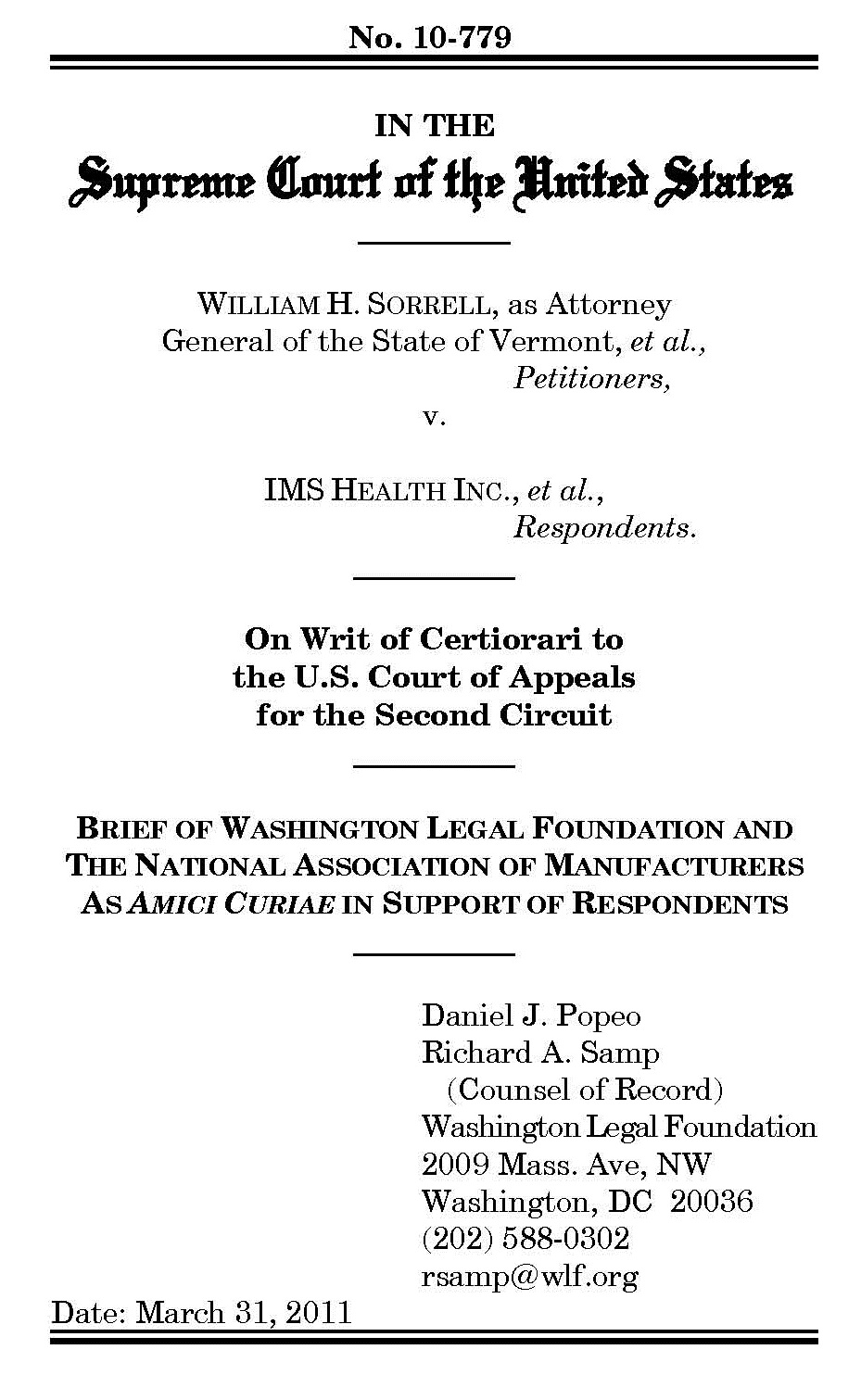 “Amicus curiae” translates into “friend of the court.” Of course those of us who regularly file such briefs strive to offer courts our assistance in understanding the facts and issues before them. But an effective amicus brief is as much a friend of the Petitioner or Respondent (though some briefs are filed in support of neither) as it is of the court. The amicus briefs filed in Sorrell v. IMS Health Inc. (argued Tuesday, April 26 in the Supreme Court) provide an excellent example of how litigants can attract persuasive friends and how those friends can strategically fortify the litigants’ arguments in court.
“Amicus curiae” translates into “friend of the court.” Of course those of us who regularly file such briefs strive to offer courts our assistance in understanding the facts and issues before them. But an effective amicus brief is as much a friend of the Petitioner or Respondent (though some briefs are filed in support of neither) as it is of the court. The amicus briefs filed in Sorrell v. IMS Health Inc. (argued Tuesday, April 26 in the Supreme Court) provide an excellent example of how litigants can attract persuasive friends and how those friends can strategically fortify the litigants’ arguments in court.
In their brief, IMS Health focused on why the Court should apply “strict scrutiny” when reviewing Vermont’s law prohibiting the use of prescription-history data to promote prescription drugs. They argue that such data constitutes fully protected speech akin to political speech, rather than commercial speech, which receives slightly less First Amendment protection.
The other Respondent in the case, the trade group Pharmaceutical Research and Manufacturers of America (PhRMA), which represents the recipients and users of the prescription data, argues that the law discriminates against certain speech based on the content or the speaker, a restriction which is also subject to strict scrutiny. They also argue in the alternative, however, that if the prescription data is considered commercial speech, the Vermont law cannot survive the “intermediate” level of scrutiny applied to such speech.
Because Vermont found no success in the lower courts with their arguments that the data-usage restriction directly advances the important governmental interest of managing health care costs, the state’s Supreme Court briefs attempt to convert the Vermont law into a privacy protection statute. Numerous amici supporting Vermont attempt to advance that point, arguing that the Court must choose between protecting physician and patient privacy and the commercial speech rights of companies.
It is on this intellectually diverse canvas that IMS and PhRMA’s amici went to work. Because Vermont’s brief urges the Court to defer to minimal and conclusory legislative findings when judging whether the law advances the state’s interest, Washington Legal Foundation’s brief representing WLF and the National Association of Manufacturers focuses in part on that argument. We refute the precedents Vermont cites, arguing that the Court has deferred to legislative findings in First Amendment cases only where the challenged law was content neutral, which the Vermont law is not. Our brief also challenged the state’s claim that the law protected physician privacy, a contrived interest which, even if it were the purpose of the law, is not directly advanced by the law.
Several other briefs addressed the state’s and its amici‘s claims on prescriber and patient privacy. The brief of the association for chain drug stores like CVS and Walgreen focused entirely on why prescribers don’t possess a privacy interest in the prescription-history data and why patient privacy is not at issue in the case. The brief of an Ontario-based health privacy researcher and a Brooklyn Law School professor is particularly notable because it directly rebuts claims of several Vermont amici that patient data is at risk of being exposed if the state law is struck down.
Amicus briefs in First Amendment cases often focus on the value of the speech being restricted. A brief by two former federal Department of Health & Human Services Secretaries, Dr. Louis Sullivan and Tommy Thompson, provides this perspective, explaining the critical role prescription-history data plays in improving health care and identifying disparities in health care delivery. Sullivan and Thompson also illuminate the reality that if the commercial uses of prescription data are eliminated, “existing databases are certain to degrade, becoming less current, complete, and representative of the population over time.” Simply put, the commercial uses of this data make it possible for all of the other valuable, non-commercial uses.
IMS Health’s argument that the Court should categorize prescription-history data as fully protected, non-commercial speech is a bold one, so support of it by amici was very important. This argument garnered amicus support from such well-established institutions as the U.S. Chamber of Commerce, the Cato Institute, and media giants Bloomberg and McGraw-Hill, as well as one relatively new organization, TechFreedom. One other brief, for the Genetic Alliance and the National Organization for Rare Disorders, is particularly interesting because much of it is devoted to arguing that Vermont cannot show that the speech ban is advancing any legitimate state interest, which is the first step in courts’ analysis of First Amendment restrictions.
As is common in cases of this magnitude, the Supreme Court Justices and their clerks certainly have lots of “friends” who have provided hundreds of pages of thoughts on Sorrell v. IMS Health Inc. and the facts and issues it presents. What impact all of our collective arguments will have is rather uncertain, but in the end, we appreciate having the opportunity to make our views known in the advancement of vital constitutional rights.
